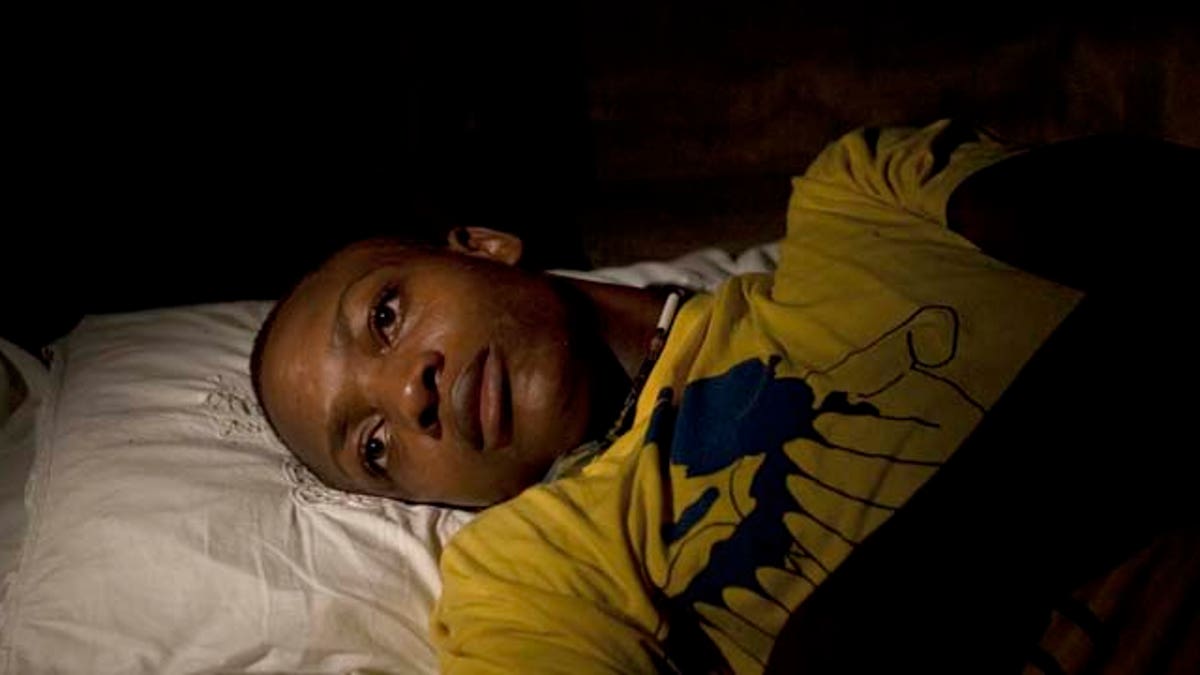
In this picture taken Sept. 3, 2011, an 18-year-old man who claims he was sexually abused by Uruguayan peacekeepers lies on his bed at his home in Port Salut, Haiti. A preliminary U.N. investigation has found no evidence for allegations that Uruguayan peacekeepers raped the 18-year-old man, Uruguay's Defense Ministry says, but the troops broke rules by having a civilian in their barracks. The alleged victim was snatched by a soldier outside the front gate of a U.N. base and was taken inside, according to the judge, Paul Tarte, and the alleged victim's mother. (AP Photo/Dieu Nalio Chery) (AP2011)
The alleged sex abuse of a Haitian teenager by Uruguayan sailors prompted a confab of Latin American leaders to discuss the future of U.N. peacekeepers in the ravaged country.
Foreign ministers and defense chiefs met Thursday to evaluate what role the international body will play in the Caribbean island moving forward.
Brazil has made public its wish to reduce its forces ahead of an eventual withdrawal, and Uruguayan President José Mujica seconded that idea ahead of the meeting in Montevideo.
"We are not in Haiti to retire there," Mujica said Wednesday after he offered apologies to the people of Haiti over the alleged sex abuse case.
Uruguay is committed to help form an internal security force so the Haitians can take care of themselves, the president said when questioned by reporters at an education summit.
- How Celebrities Stay in Shape
- “Barack Obama and the Seven Latin American Dwarves”
- Our American Dream: For Black Hawk Helicopter Pilot Commander Marisol Chalas, the Sky is No Limit
- Cholera in Dominican Republic Has Killed 14, Spreads to Most of Country
- Former Miss Venezuela Loses Battle with Breast Cancer
- First Cholera Death Reported in Dominican Republic
Mujica said he had not yet received a response to his letter to Haitian President Michel Martelly apologizing for the abuse episode.
The incident became public last week after several Haitians spotted a sailor's cellphone video showing the man being held face-down inside a U.N. base at Port-Salut as laughing peacekeepers threatened to rape him. A spokesman for the Uruguayan defense ministry was reprimanded for dismissing the event as a "bad joke."
Mujica said Wednesday that "between soldiers there's always a certain amount of horseplay; it's inevitable."
But he added that the point of view of both sides in such incidents must be taken into account, in particular "the weakest," meaning the Haitian.
Martelly condemned the alleged assault of the young Haitian as an "act that revolts the national conscience."
The U.N. peacekeeping mission arrived in 2004 to help control the chaos that followed the ouster of President of Jean-Bertrand Aristide. Since then, it's been instrumental in maintaining stability in the coup-prone country, and the force has helped allow a democratically elected president serve two full terms for the first time in Haitian history.
But some Haitians see the world body as an occupying force that has done little to ameliorate the country's misery. In 2007, almost a tenth of its Sri Lankan battalion was recalled because of a sex-abuse scandal. Last year, a contingent from Nepal was blamed for introducing cholera to Haiti, which caused an outbreak that has killed more than 6,200 people and sickened another 439,000, according to Haiti's health ministry.
Despite the controversies, the mandate is likely to be renewed. Martelly has asked the U.N. mission to focus more on economic development in this quake-damaged nation but he has also asked the force to quash gangs in Port-au-Prince slums that have been strongholds for his political opponents.
The force also helps bolster Haiti's weak economy by spending, from purchasing snacks off the streets to dining at high-end restaurants in the capital.
Even so, some Haitian politicians have used the abuse allegations to criticize the U.N. mission.
Eric Jean-Baptiste, a former mayoral candidate and owner of a lottery company, cut a check for $2,500 so that the alleged victim can pay for a lawyer. Jean-Baptiste's face and name have appeared on newly built billboards in the Haitian capital and Port-Salut denouncing the United Nations and cholera as "twins."
Jean-Baptiste also led several hundred protesters outside the U.N. base in Port-Salut on Monday to call for the U.N. mission's departure. He was joined by Youri Latortue, an influential senator who represents the Artibonite, a western department in which Haiti's cholera cases were first documented.
"We know that while there is justifiable outrage, there are also some who would use this for political ends," Nigel Fisher, U.N. deputy envoy in Haiti, told The Associated Press.
Mujica's signed letter to Martelly said he feels personally ashamed and promised maximum penalties for those responsible.
Based on reporting by The Associated Press.
Follow us on twitter.com/foxnewslatino
Like us at facebook.com/foxnewslatino
